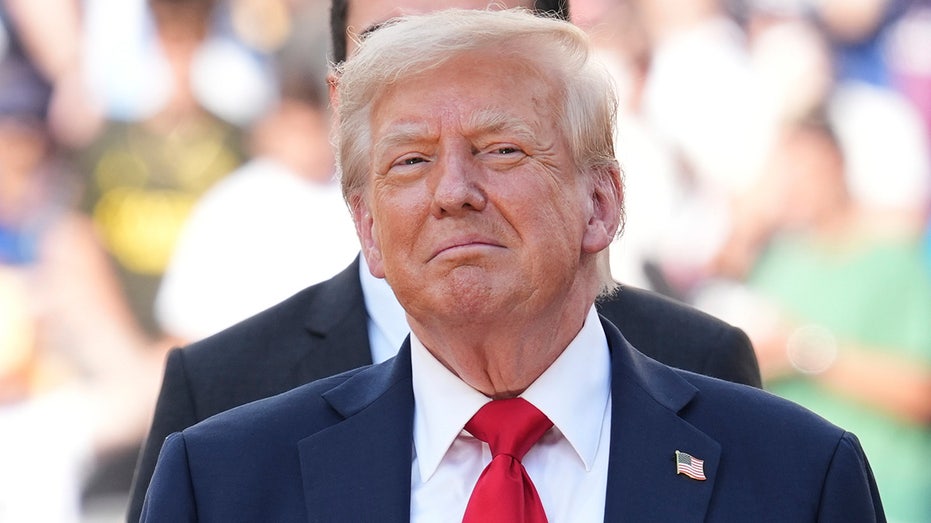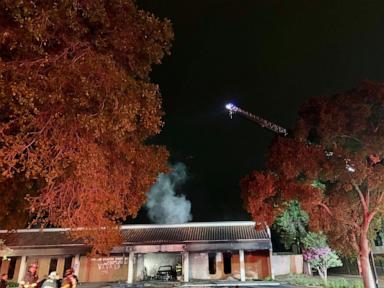Throughout Donald Trump’s decade in politics, his critics have reacted predictably, almost reflexively, to his string of seeming career-ending statements, precedent-shattering policies and perceived missteps. This is it. This time, Trump has finally done something so outrageous, so over the line, that his popularity will plunge and never recover.
But it’s never really happened.
Compared with past presidents, Trump’s job approval ratings have, for the most part, moved within a narrow range. The reason is simple: He has always had a low ceiling, constrained by the single-digit approval he gets from Democrats and independents who lean Democratic. But he also has a high floor, thanks to the steady, 80 percent-plus support he invariably receives from the GOP base.
That’s what makes the firestorm surrounding the administration’s handling of the Jeffrey Epstein files such a potentially pivotal moment for the president. Coming on the heels of the U.S. bombing of Iran (not to mention passage of the so-called Big Beautiful Bill, faulted by some conservatives for its deficit-busting spending), the Epstein affair is about to reveal something important about the resilience of Trump’s bond with the GOP base. The suspicion Epstein is generating among Republicans is raising questions about whether Trump’s floor may finally crack — and, one way or another, become the “it” moment his opponents have eagerly awaited for so long.
For most of his first term, Trump’s job ratings were a model of consistency. An analysis by Pew Research Center (where I was director of political research for the past decade) in August 2020 found that his job rating had fluctuated a mere 6 points — from 38 percent to 44 percent — during his first three years in office, a period that encompassed, among many other things, the 2017 violence in Charlottesville, Va., enactment of Trump’s first tax bill and, of course, the outbreak of the coronavirus pandemic.
It took the extraordinary events of Jan. 6, 2021, to break this pattern. Following the assault on the U.S. Capitol by his supporters, Trump left office with his lowest job approval ever at 34 percent. But clearly, his overall political standing suffered no permanent damage.
Trump launched his second term in January flirting with 50 percent approval in many polls; this passed for a “honeymoon” by Trump’s own modest standards. By the 100-day mark in April, which happened to come shortly after the tumultuous rollout of his tariff policy, Trump’s ratings had fallen to the mid-40 percent range across the major polling aggregators — a return to his familiar resting place.
At the time, however, this seemed like a potential turning point, with the possibility of more instability to come. “Trump’s Approval Rating Has Been Falling Steadily,” declared The New York Times, in a typical headline from three months ago.
Since then, however, not much has changed.
That’s why the furor over the administration’s handling of the Epstein files is potentially so important. It’s not just MAGA leaders and influencers who are upset with the administration — it’s rank and file Republicans. Quinnipiac University’s latest survey, released July 16, found more than three times as many registered voters disapproved (63 percent) than approved (17 percent) of how the administration has dealt with the Epstein affair. More revealing, Republicans, who normally can be counted on to overwhelmingly back Trump’s handling of any issue, were divided: 40 percent approved while 36 percent disapproved and a suspiciously large minority (24 percent) declined to answer.
Yet here’s the thing: that same survey found that Trump’s job rating was virtually unchanged since June, with 40 percent approving and 54 percent disapproving (Quinnipiac polls consistently show lower approval ratings for Trump than do many other surveys). Nor was there any evidence that Trump’s image among Republicans had been damaged; 90 percent approved of the way he was doing his job as president. This week’s CNN survey also showed no real change in Trump’s approval.
Clearly, the Epstein controversy is in its early stages and many Americans are still forming their opinions. But it’s not occurring within a vacuum: Trump is facing increasing pressure on many other fronts as well. Inflation is creeping back up, the polling on the BBB has been abysmal, and Trump’s tariffs may yet jolt the economy again, when (or if) they kick in next month.
The backdrop here matters a great deal. Since he was first elected, Trump has never been all that popular, especially when compared with his predecessors. His first-term average approval rating of 41 percent placed him below every other president dating back to Harry S. Truman, according to Gallup Org. Trump barely edged out former president Biden, whose 42 percent average was the second-lowest.
His second term ratings also are weaker than those of his past presidents. The main difference among the polls at his 100-day milestone was whether Trump was the least popular modern president ever at that point, or whether his rating was slightly higher than his own lackluster first-term approval mark.
However, Trump thus far has also been able to avoid the devastating ratings declines that other presidents have suffered, despite the fact that his approval on specific issues — most notably, immigration and the economy — is in negative territory.
Four years ago this month, Joe Biden’s presidency ran aground on the twin shoals of Afghanistan and inflation. Prior to that point, his job ratings were consistently above 50 percent; after that, he was mired in negative territory for the rest of his term. Barack Obama, who arrived in office with glittering 60 percent plus job ratings, suffered a sharp ratings falloff during his first year in office. George W. Bush’s job approval also fell throughout the first year of his second term.
Because Trump’s approval ratings move in such a narrow range, even small changes — positive or negative — over the next several months could have major consequences. Even at his current level of support, Trump’s job rating almost certainly will act as a drag for Republican candidates for the House and Senate.
The narrative around Trump’s presidency would shift as well. In the world of poll coverage, change sells, while lack of change is a signal to the reader to read no further. As a result, there is a constant temptation for partisans and more neutral observers alike to exaggerate small shifts in individual surveys to bolster preferred storylines; thus, Trump’s job approval has at times been variously described as “plummeting,” “surging” or “at record lows (or highs),” often based on limited evidence.
But a decisive change in the trajectory, seen across a number of high-quality surveys, would be a different matter, reshaping long-term perceptions of the president.
Based on Trump’s history, it is almost impossible to imagine him approaching either the lofty heights of Bill Clinton (73 percent approval in December 1998, following his House impeachment) or the subterranean depths of George W. Bush (25 percent approval in December 2008, during the financial crisis). Because of historic levels of partisan polarization, the days of extraordinarily high or low presidential job ratings are probably over.
Historically, presidents looked to 50 percent job approval as the key indicator of their standing with the public. For Trump, 40 percent is the new 50 percent. The remainder of his second term will look very different if his job ratings are consistently below that line rather than above it. How the Epstein saga plays out could be a major factor.
.png)















 English (US)
English (US)